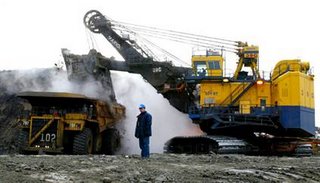
The Athabasca Tar Sands are a huge boon to the province of Alberta. One of the greatest blessings for the province's politicians and oil execs is that the tar sands are so far north - out of sight, out of mind. You wouldn't want that mess in your back yard, you wouldn't want it within fifty miles of your back yard.
The tar sands are literally the world's filthiest oil source. Extracting synthetic oil from the sandy tar produces vast amounts of GHG, other air pollutants, water pollutants and soil contamination. Harper likes to talk about "principle trumping the almighty dollar" - yeah sure, Steve, just so it's not at home, eh?
There are problems associated with tar sand mining and refining that will cause significant effects to your pocketbook in years to come. One of these is natural gas prices. If you've got a gas-fired water heater or furnace of fireplace, you can expect to face hefty increases in your utility bills in coming years because of the tar sands' insatiable appetite for natural gas.
Let's see - we take the cleanest fossil fuel, natural gas, and squander it in a filthy process to produce a dirty fossil fuel, oil, to fill America's gas tank. You gotta like the logic there. Oh yeah, right, I forgot - the almighty dollar.
Here's moe detail on the tar sands/natural gas conundrum from energybulletin.net:
"Production of "oil" from the tar sands is a very energy-intensive process. Production estimates for 2025 are that the energy input will require between 1.6-2.3 billion cubic feet (bcf) of natural gas per day, approximately equal to the planned maximum capacity of the proposed Mackenzie Valley gas pipeline (1.9 bcf/d) out of northern Canada, or about one-fifth of anticipated daily Canadian gas production. Pipelines or no, the energy requirements of the projects planned for tar sands development already exceed the amount of available natural gas from the entire Mackenzie River project. Virtually all estimates for natural gas usage in tar sands operations by 2015, just 10 years hence, exceed the projections for available amounts of natural gas. Something has got to give.
"In another respect, using natural gas for tar sands development creates a political issue for Canada due to its obligations under the North American Free Trade Agreement (NAFTA). The NAFTA issue arises because if Canada uses natural gas for tar sands development, that nation will have that much less gas available for export to the U.S. But also under the terms of NAFTA, Canada cannot reduce natural gas exports to the U.S. unless it also reduces natural gas consumption within Canada. And because sometimes it gets cold in Canada in the wintertime, there may be a domestic Canadian political issue wrapped up in all of this."
Maybe Stevie ought to take some time out of "nation building" to start giving us some straight talk about how he's going to protect our natural gas supply. He won't because he isn't.
Then, as the report points out, there's the issue of water:
"Another limitation on tar sands expansion is that processing capacity is limited by water supply. Much water is already being recycled using current technology, but current production techniques require 1-2 barrels of "makeup" water per barrel of product. It will be imperative to develop technology that uses less water or that recycles even more of the water being used. And doing this is not nearly as easy as you might think.
"Surface water flows, principally from the Athabasca River, are simply inadequate to meet forecast needs. And deeper water, from underground aquifers, is saline and must be diluted with fresh water or otherwise desalinated. Whoops. This will require more of that energy input stuff.
"Immense amounts of water are currently being discarded into settlement ponds, in which it may take 200 years for the smallest particles to settle down to the bottom. Meanwhile, the water is toxic, and mixed with exceedingly high levels of heavy metals and other exotic elements that you probably do not want to eat. Some of these impoundment ponds are many miles in area, and will pose an environmental problem or hazard for many centuries."
Lots of room for principles here but don't hold your breath. Rona ain't ridin' to the rescue.
Wouldn't it be grand if we told the tar sands companies to find ways to resolve these problems before they go digging for any more bitumen? They tell us all the answers are just around the corner, the technology is coming. Is it?
The technology may in fact be developed but how willing will producers be to foot that substantial bill on an energy project that already has unbelievably low "energy return on investment" ratios of somewhere between just 5-10%? With those margins there's not much incentive to take responsibility for cleaning up tar sand extraction.
The worst part is the EROI (return on investment) only recognizes the producers' costs. It makes no allowance for the environmental and social costs inflicted by the tar sands project but, then again, why should it? You and I will be footing that bill.
Hey Steve, stop shoving that Chinese fella around and let's talk about your principles.
No comments:
Post a Comment